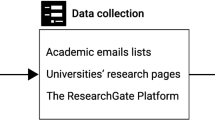Abstract
Implied by the norm of universalism in modern science, known from Merton's CUDOS-normset, is the demand that scientific careers should be open to talents, independent of personalattributes such as race, religion, class, and gender. In spite of a large amount of studies related toCUDOS-norms very few deals with class origin of researchers. Based on a survey among a sampleof 788 Danish researchers this article investigates class bias, compared to gender bias inresearcher recruitment and careers, and researcher assessments of impartiality and objectivity ofevaluations and reward system. The data demonstrate very strong class bias, and also confirm thewell-known gender bias in recruitment, class bias being the strongest. This is shown to be mainlybecause of bias in the educational system, however. Concerning later career attainment bias is alsofound, but much weaker, and most pronounced concerning social origin. Regarding researcherassessments of impartiality there are no indications of strong mistrust among researchers ingeneral; nor are there significant differences in degree of trust in reward system, conditioned byclass origin or gender. In conclusion, the analysis does not lend strong support to an assumption ofdeviance from norms of universalism.
Similar content being viewed by others
References
Later published as “The normative structure of science”, In: R. K. MERTON, The Sociology of Science. Theoretical and Empirical Investigations, Chicago, The University of Chicago Press (1973).
R. K. Merton, The Sociology of Science. Theoretical and Empirical Investigations, Chicago, The University of Chicago Press (1973) p. 270.
R. K. Merton, The Sociology of Science. Theoretical and Empirical Investigations, Chicago, The University of Chicago Press (1973) p. 272.
H. Zuckermann, The Sociology of Science, In: N. J. Smelser (Ed.), Handbook of Sociology. Newbury Park: Sage Publications (1988) 514-520; S. COLE, The Making of Science. Cambridge, Mass.: Harvard University Press (1992) pp. 160-205.
S. Cole, The Making of Science. Cambridge, Mass.: Harvard University Press (1992) p. 163.
S. Cole, The Making of Science. Cambridge, Mass.: Harvard University Press (1992) p. 179. The citation in the citation is from R. K. MERTON, The Sociology of Science. Theoretical and Empirical Investigations, Chicago, The University of Chicago Press (1973) p. 270.
F. Galton, English Men of Science. London: Macmillan & Co (1874); T. GEIGER, Den danske intelligens fra Reformationen til Nutiden. Aarhus: Universitetsforlaget (1949); A. ROE, The Making of a Scientist. Westport, Connecticut: Greenwood Press (1952); S. S. WEST, Class Origin of Scientists, In: B. T. EIDUSON, L. BECKMAN (Eds), Science as a Career Choice, New York, Russell Sage Foundation (1973); M. WATT BOOLSEN, O. AAGAARD SØRENSEN, Samfundsvidenskabelige institutioner og publikationer i Danmark. København: Statens Samfundsvidenskabelige Forskningsråd (1976); W. PEARSON, Black Scientists, White Society, and Colorless Science, Millwood, N. Y.: Associated Faculty Press (1985); P. BOURDIEU, Homo Academicus, Cambridge, Polity Press (1988); Y. XIE, The social origins of scientists in different scientific fields, Research in Social Stratification and Mobility, 11 (1992); H. ZUCKERMAN, Scientific Elite. Nobel Laureates in the United States, New York, The Free Press (1977).
W. Pearson, Black Scientists, White Society, and Colorless Science, Millwood, N. Y.: Associated Faculty Press (1985); Y. XIE, The social origins of scientists in different scientific fields, Research in Social Stratification and Mobility, 11 (1992).
H. Andersen, Forskere i Danmark-videnskabssyn, vurderinger og aktiviteter. København: Sociologisk Institut, Københavns Universitet (1998).
E. J. Hansen, The Distribution of Living Conditions in Denmark, København: Socialforsknings-instituttet (1982).
M. Watt Boolsen, O. Aagaard SØrensen, Samfundsvidenskabelige institutioner og publikationer i Danmark. København: Statens Samfundsvidenskabelige Forskningsråd (1976) 51.
S. S. West, Class origin of scientists. In: B. T. Eiduson, L. Beckman (Eds), Science as a Career Choice, New York: Russell Sage Foundation(1973) p. 71.
Y. Xie, The social origins of scientists in different scientific fields, Research in Social Stratification and Mobility, 11 (1992).
P. Bourdieu, Homo Academicus, Cambridge: Polity Press (1988) p. 44.
O. Hellevik, Class inequality and egalitarian reform, Acta Sociologica, 40(1997) 377-398.
Y. Xie, The social origins of scientists in different scientific fields, Research in Social Stratification and Mobility, 11 (1992) p. 273.
Ibid. pp. 273-274.
B. StÅhle, Kvinder og mænd i dansk universitetsforskning i 1990'erne. København: Undervisningsministeriet (1998) p. 17.
H. Andersen, Forskerrekruttering og social baggrund. Sociologisk rapportserie nr. 2. København: Sociologisk Institut, Københavns Universitet 1997.
H. Andersen, Køn og karriereforhold i dansk forskning-særligt i samfundsvidenskaberne. Resultater fra en interviewundersøgelse. Sociologisk rapportserie nr. 10 (1998).
Quoted in J. R. Cole, B. Singer, A theory of limited differences: Explaining the productivity puzzle in science, In: H. Zuckerman, J. R. Cole, J. T. Bruer (Eds), The Outer Circle. Women in the Scientific Community, New York, W.W. Norton & Company (1991) p. 278.
S. Kyvik, M. Teigen, Likestilling på universitetet. En undersøkelse av kvinnelige og mannlige forskere, Oslo, Utredningsinstituttet for forskning og høyere utdanning (1994) p. 29.
H. Andersen, Forskerrekruttering og social baggrund. Sociologisk rapportserie nr. 2. København: Sociologisk Institut, Københavns Universitet (1997).
H. Andersen, Gender inequality and paradigms in the social sciences, Social Science Information (forthcoming).
Author information
Authors and Affiliations
Rights and permissions
About this article
Cite this article
Andersen, H. The norm of universalism in sciences. Social origin and gender of researchers in Denmark. Scientometrics 50, 255–272 (2001). https://doi.org/10.1023/A:1010521606702
Issue Date:
DOI: https://doi.org/10.1023/A:1010521606702




